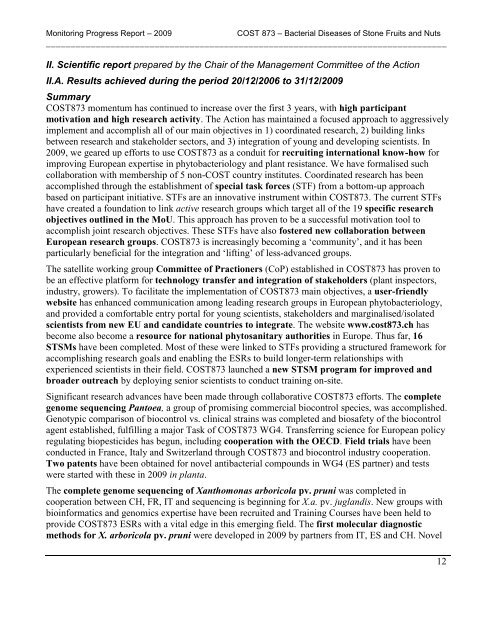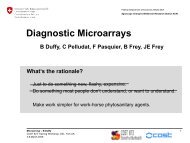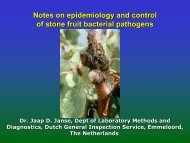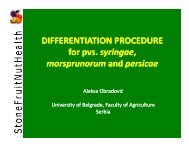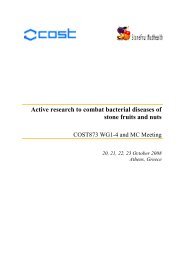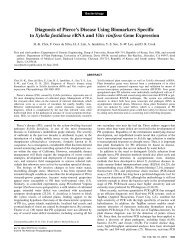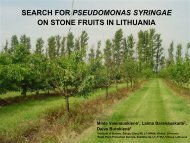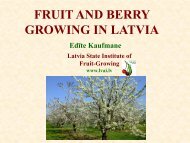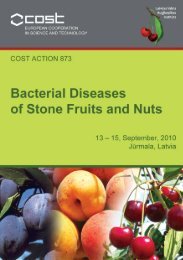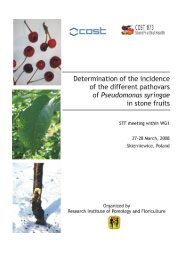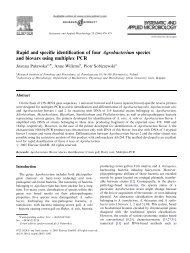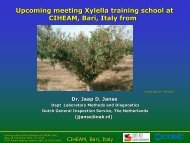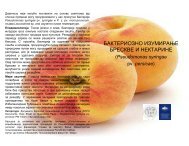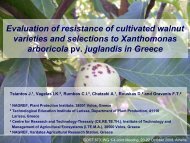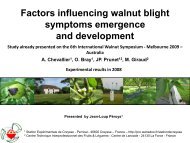Annual progress report - Cost 873
Annual progress report - Cost 873
Annual progress report - Cost 873
Create successful ePaper yourself
Turn your PDF publications into a flip-book with our unique Google optimized e-Paper software.
Monitoring Progress Report – 2009<br />
COST <strong>873</strong> – Bacterial Diseases of Stone Fruits and Nuts<br />
_________________________________________________________________________________<br />
II. Scientific <strong>report</strong> prepared by the Chair of the Management Committee of the Action<br />
II.A. Results achieved during the period 20/12/2006 to 31/12/2009<br />
Summary<br />
COST<strong>873</strong> momentum has continued to increase over the first 3 years, with high participant<br />
motivation and high research activity. The Action has maintained a focused approach to aggressively<br />
implement and accomplish all of our main objectives in 1) coordinated research, 2) building links<br />
between research and stakeholder sectors, and 3) integration of young and developing scientists. In<br />
2009, we geared up efforts to use COST<strong>873</strong> as a conduit for recruiting international know-how for<br />
improving European expertise in phytobacteriology and plant resistance. We have formalised such<br />
collaboration with membership of 5 non-COST country institutes. Coordinated research has been<br />
accomplished through the establishment of special task forces (STF) from a bottom-up approach<br />
based on participant initiative. STFs are an innovative instrument within COST<strong>873</strong>. The current STFs<br />
have created a foundation to link active research groups which target all of the 19 specific research<br />
objectives outlined in the MoU. This approach has proven to be a successful motivation tool to<br />
accomplish joint research objectives. These STFs have also fostered new collaboration between<br />
European research groups. COST<strong>873</strong> is increasingly becoming a „community‟, and it has been<br />
particularly beneficial for the integration and „lifting‟ of less-advanced groups.<br />
The satellite working group Committee of Practioners (CoP) established in COST<strong>873</strong> has proven to<br />
be an effective platform for technology transfer and integration of stakeholders (plant inspectors,<br />
industry, growers). To facilitate the implementation of COST<strong>873</strong> main objectives, a user-friendly<br />
website has enhanced communication among leading research groups in European phytobacteriology,<br />
and provided a comfortable entry portal for young scientists, stakeholders and marginalised/isolated<br />
scientists from new EU and candidate countries to integrate. The website www.cost<strong>873</strong>.ch has<br />
become also become a resource for national phytosanitary authorities in Europe. Thus far, 16<br />
STSMs have been completed. Most of these were linked to STFs providing a structured framework for<br />
accomplishing research goals and enabling the ESRs to build longer-term relationships with<br />
experienced scientists in their field. COST<strong>873</strong> launched a new STSM program for improved and<br />
broader outreach by deploying senior scientists to conduct training on-site.<br />
Significant research advances have been made through collaborative COST<strong>873</strong> efforts. The complete<br />
genome sequencing Pantoea, a group of promising commercial biocontrol species, was accomplished.<br />
Genotypic comparison of biocontrol vs. clinical strains was completed and biosafety of the biocontrol<br />
agent established, fulfilling a major Task of COST<strong>873</strong> WG4. Transferring science for European policy<br />
regulating biopesticides has begun, including cooperation with the OECD. Field trials have been<br />
conducted in France, Italy and Switzerland through COST<strong>873</strong> and biocontrol industry cooperation.<br />
Two patents have been obtained for novel antibacterial compounds in WG4 (ES partner) and tests<br />
were started with these in 2009 in planta.<br />
The complete genome sequencing of Xanthomonas arboricola pv. pruni was completed in<br />
cooperation between CH, FR, IT and sequencing is beginning for X.a. pv. juglandis. New groups with<br />
bioinformatics and genomics expertise have been recruited and Training Courses have been held to<br />
provide COST<strong>873</strong> ESRs with a vital edge in this emerging field. The first molecular diagnostic<br />
methods for X. arboricola pv. pruni were developed in 2009 by partners from IT, ES and CH. Novel<br />
12


